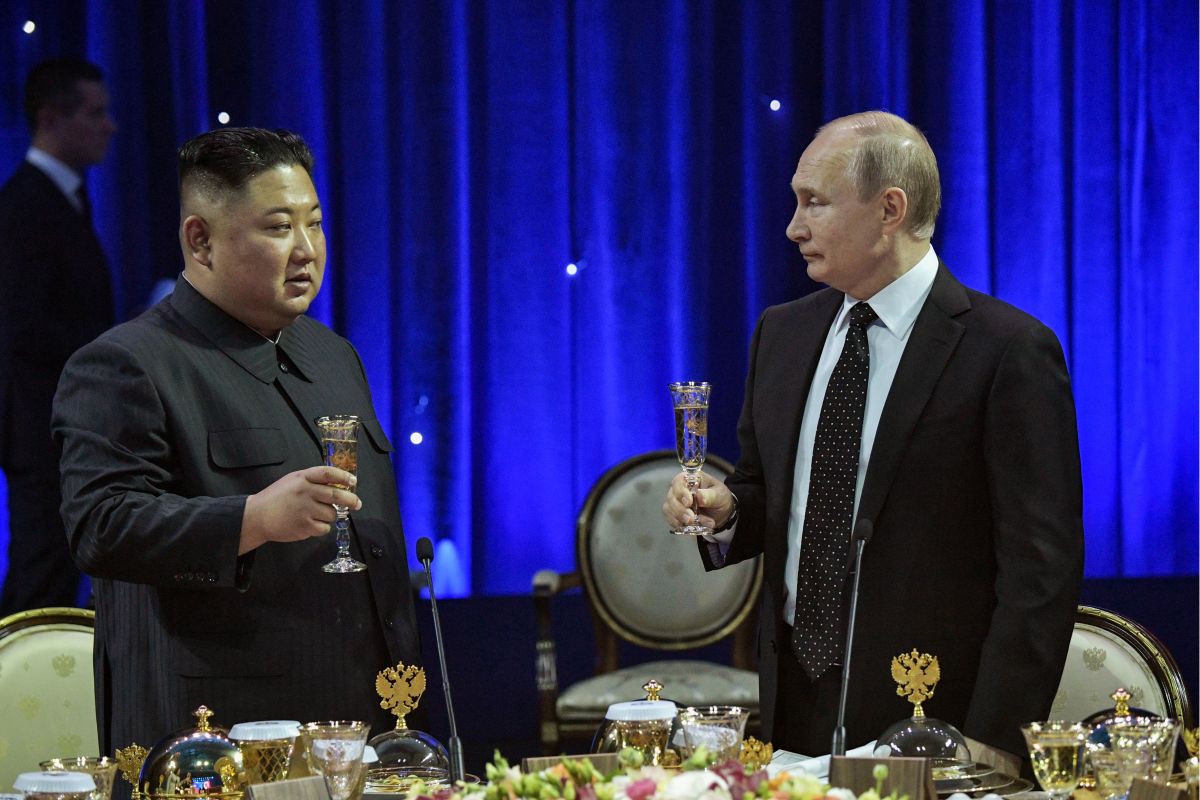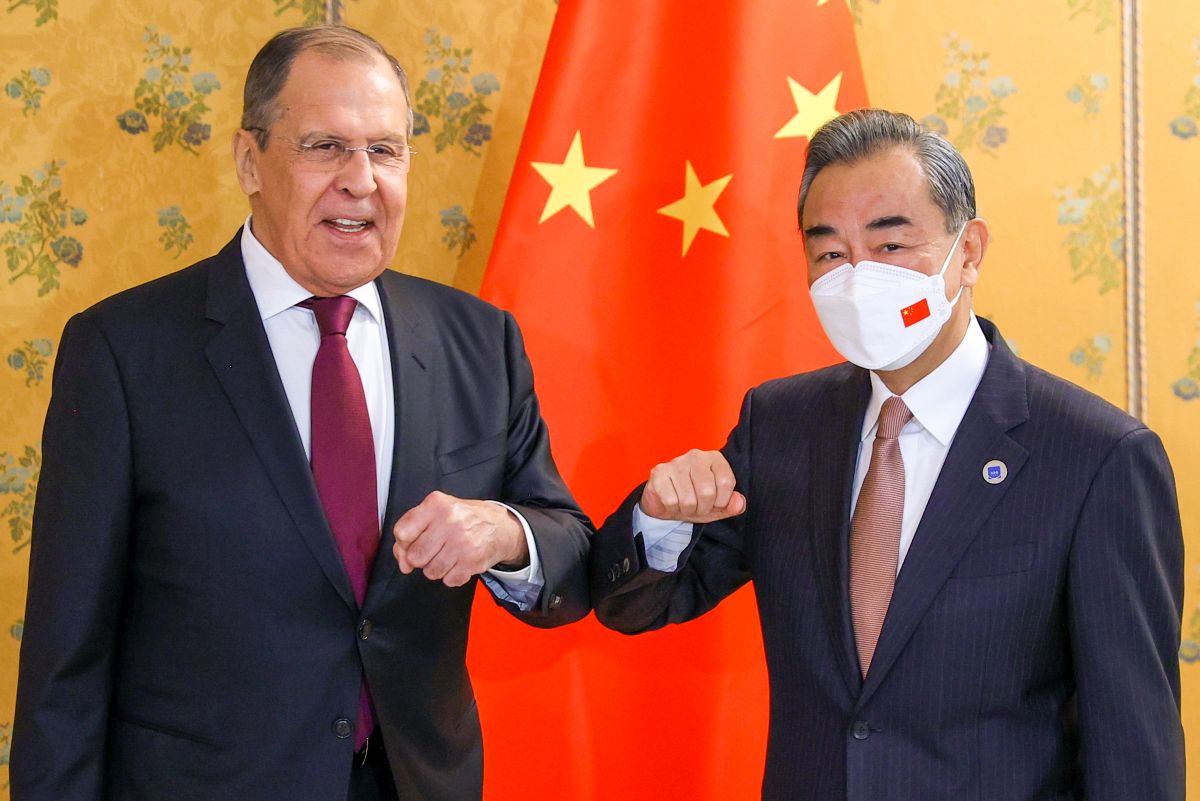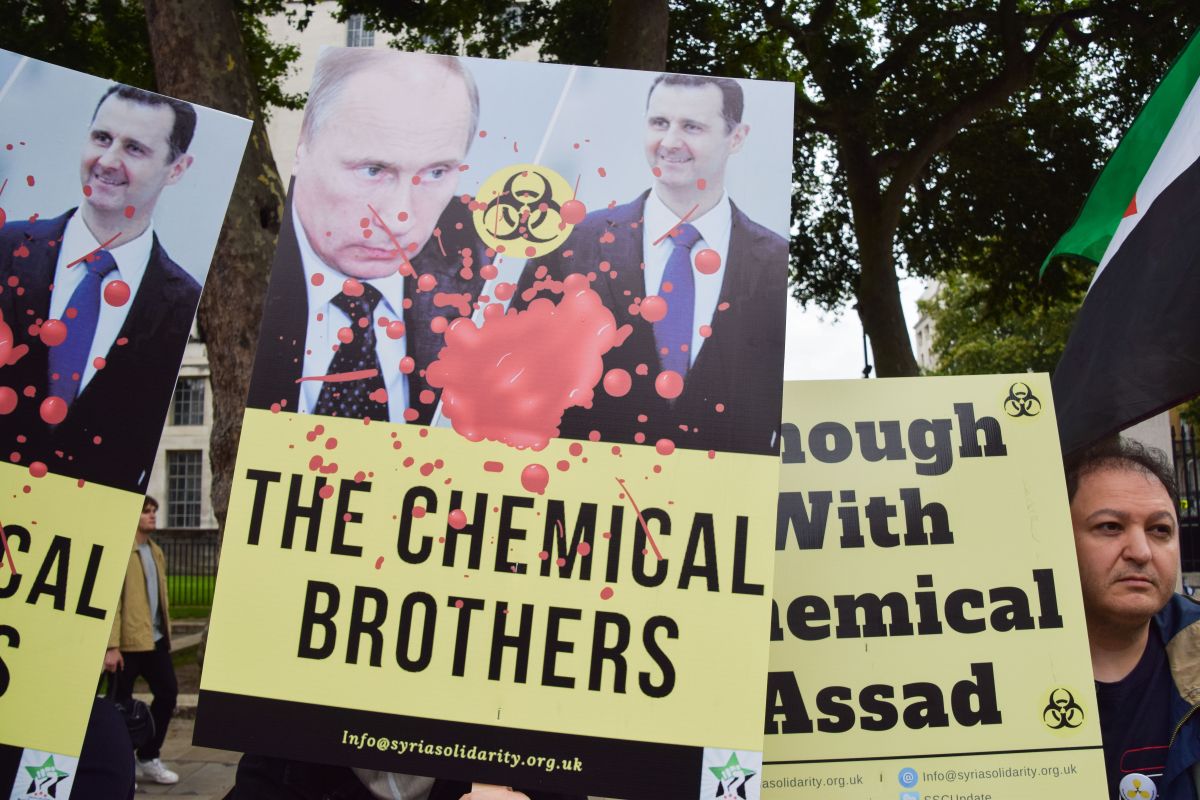North Korea's Support for Russia's Aggression against Ukraine
North Korea was one of only five countries that voted against the UN General Assembly (UNGA) resolution condemning Russia’s aggression against Ukraine. The North Korean support for Russia results mainly from both countries’ hostility towards the U.S., their relatively close bilateral relations in recent years, and Russia’s stance for easing sanctions on North Korea. North Korea-Russia rapprochement may result in cooperation in circumventing sanctions. Russia’s likely veto on any further UN Security Council (UNSC) resolutions on North Korea may additionally induce the North to resume long-range ballistic missile and nuclear tests.
 Alexei Nikolsky /TASS/ FORUM
Alexei Nikolsky /TASS/ FORUM
North Korea’s Position on Russia’s Attack on Ukraine
For several years, North Korea has been supporting Russia’s diplomatic policy towards Ukraine. In 2014, it was one of 11 countries that voted against UNGA Resolution 68/262 condemning Russia’s annexation of Crimea. Prior to the invasion, North Korea described this year’s concentration of Russian troops around Ukraine as a “justified response” to U.S. and NATO activity in the region. While the North Korean Ministry of Foreign Affairs has so far not issued a separate statement on the war in Ukraine, which it described as the “Ukrainian crisis”, it has indirectly alluded to it in several communiques. For example, in an article dated 26 February and ministry spokesman’s statement of 28 February, the current situation in Ukraine was presented as a result of NATO’s expansion, destabilising actions by the U.S. around the world, and failure to take into account Russia’s “legitimate” security concerns.
In the vote on 2 March, North Korea unequivocally supported Russia, opposing the adoption of the UNGA resolution condemning the Russian invasion of Ukraine. In addition, the North Korean ambassador to the United Nations, Kim Song, accused the U.S. of causing the war in Ukraine and the West of applying double standards, emphasising the earlier “devastation of Iraq, Afghanistan and Libya”. Further coordination of the positions of Russia and North Korea was demonstrated by the meeting on 3 March in Pyongyang between Kim Jong Gyu, director general of the department for European affairs at the North Korean MFA, and the Russian ambassador, Alexander Matsegora. The war in Ukraine was not explicitly mentioned, but the strengthening of strategic cooperation on “regional and international situations which are raised as urgent and concern both sides” was signalled in the communique.
Reasons for North Korea’s Support for Russia
The position of North Korea on the Russian aggression against Ukraine results from the relatively close relations between North Korea and Russia. In 2019, Kim Jong Un met with Vladimir Putin to reinforce the symbolism that North Korea is not isolated internationally and has the potential to manoeuvre in foreign policy. However, regular contacts between both countries have been maintained primarily at the lower levels. The Russian embassy in Pyongyang has been playing a particularly important role, and its activity in the last 2-3 years has distinguished itself from the suspension of most foreign contacts by North Korea during the COVID-19 pandemic. This does not change the fact that the North Korean-Russian relations are limited. Sparse economic contacts declined during the pandemic: trade amounted to $47.9 million in 2019, $43 million in 2020, and $0.04 million in 2021. Russia is also not the most important partner in the foreign policy of North Korea, for which China, the U.S., and South Korea are more crucial and traditional directions.
Despite its limitations, Russia can be perceived by North Korea as a potentially valuable partner. This is due to the experience of Russia’s involvement in the Korean Peninsula, including its participation in the six-party talks in 2003-2008 and interest in infrastructure cooperation (gas pipeline, railways) with both Koreas. For North Korea, Russia’s significance stems from its status as a permanent member of the UN Security Council (UNSC) and its confrontational attitude towards the U.S. Both North Korea and Russia view the United States as a threat and use anti-American propaganda, blaming the U.S. for destabilisation in various parts of the world.
From the North Korean perspective, Russia’s position on the sanctions imposed on the North is important and favourable. For years, Russia, together with China, has been calling in the UNSC to loosen the restrictions imposed on North Korea, arguing it with humanitarian reasons, the need to ease tensions on the Korean Peninsula, and the desire to pursue its own economic interests. In fact, however, Russia has aimed to undermine Western sanctions policy, which also has affected it since the annexation of Crimea in 2014. Moreover, Russia is one of the countries that have insufficiently and selectively implemented sanctions on North Korea. According to UN reports, in recent years, contrary to UN resolutions, Russia has imported North Korean coal, smuggled crude oil to the North, and allowed several thousand North Koreans to work on its territory. For years, North Korea has supposedly cooperated with Russia on the development of its missile potential. The transfer of technology from Russia to North Korea may be indicated by the similarities between some missile systems. The U.S. Treasury Department has regularly imposed sanctions on Russian citizens and companies suspected of supplying materials and technology to North Korea’s arms programmes.
The North Korean support for Russia also results from North Korea’s close relations with China, deepened since 2018. With regard to the war in Ukraine, North Korea uses rhetoric similar to China, speaking of “Russia’s legitimate concerns”. This may indicate an adjustment, and perhaps even coordination, of positions between North Korea and China. Moreover, from the perspective of North Korea, Russia is a country that supports China’s activities on the Korean Peninsula, but at the same time does not have significant influence there. As a result, the authorities in Pyongyang are not afraid of Russian interference in internal affairs, unlike their concerns about China.
Conclusions and Perspectives
North Korea’s diplomatic support for the Russian aggression against Ukraine is the result of the same approach taken when it recognised the annexation of Crimea in 2014. In return for its support, North Korea can expect Russia’s consent to further develop its nuclear and missile capabilities. The authorities in Pyongyang may assume that Russia will veto any UNSC resolutions concerning North Korea. This may additionally induce the North to conduct missile tests, including ICBMs, and possibly even nuclear variants, which it has been signalling since January 2021.
The fact that both North Korea and Russia are subject to sanctions could encourage the countries to cooperate in circumventing and avoiding them. Russia likely will implement restrictions on North Korea to an even lesser extent or even not at all. It may also interfere in the functioning of the UN Panel of Experts monitoring the implementation of sanctions on the North. In turn, North Korea may support Russia in cyberspace by sharing its experiences with attacks on financial institutions and theft of cryptocurrencies. Russia may also follow other North Korean practices in circumventing sanctions, such as using passports from other countries when setting up businesses and bank accounts, or registering ships with prohibited goods under foreign flags.
At the same time, sanctions on Russia may also have a negative impact on North Korea, which has used Russian banks to gain access to the international banking system. Russia’s worsening economic situation may also reduce its economic and humanitarian support for North Korea, which it has received since the beginning of the pandemic. Although propaganda of both countries will emphasise the development of economic ties, real cooperation will be very limited due to their poor economic situations. In the short term, rapprochement with Russia will be used internally by North Korea to emphasise that it is not isolated. In the long term, however, ties with Russia will not help North Korea overcome international isolation.
In the coming months, Russia may increase its diplomatic engagement on the Korean Peninsula in order to present itself as a country cooperating in solving international security problems, including those important for the U.S., such as the non-proliferation of weapons of mass destruction. North Korea may emphasise the importance of Russia, even if it is mainly propaganda, to increase pressure on the U.S. in nuclear negotiations.
China may be a factor limiting North Korea’s cooperation with Russia. The Chinese influence in the North is incomparably greater than that of Russia, and so far the countries have respected their “spheres of influence”. As a result, Russia may be forced to give way to China and limit itself to supporting China’s policy towards the Korean Peninsula. This could take the form of Russia’s participation in multilateral talks on security issues on the Peninsula, provided China pushes for such a solution. However, Russia’s participation would be contested by other potential participants, such as the U.S., Japan, and South Korea, which condemned Russia’s aggression against Ukraine.





_sm.jpg)